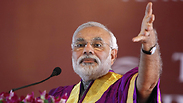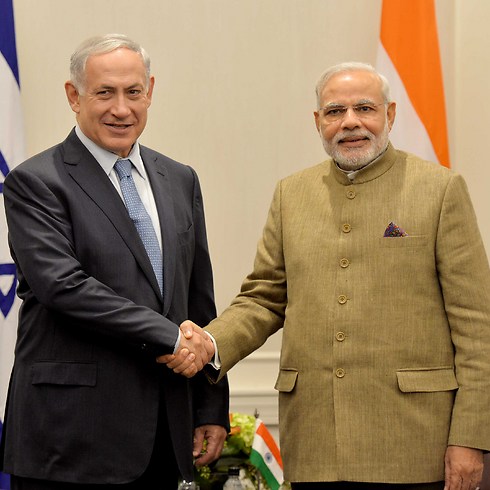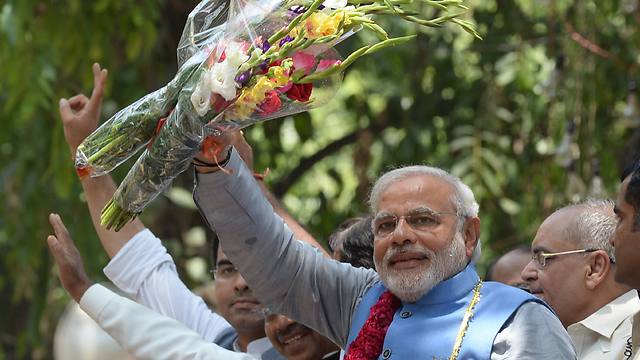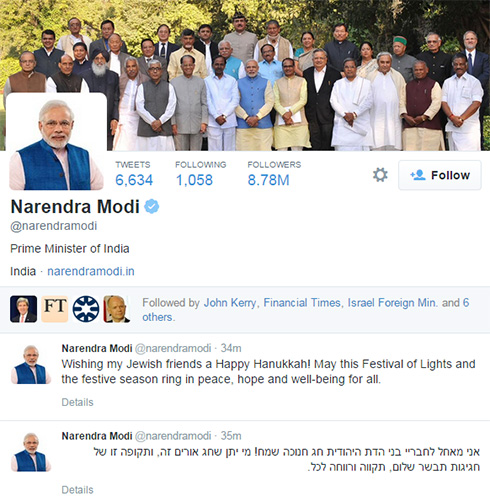
India moves toward closer ties with Israel
Warming of relations between two nations is unmistakable albeit low-key, as bilateral trade stands in excess of $5 billion and Israel turning into India's top defense supplier.
India made headlines last week when a local newspaper reported that Prime Minister Narendra Modi's recently elected government might stop its near-automatic support for the Palestinian Authority in the diplomatic arena. Such a move, which at this point is purely speculative, would mark a significant change in India's voting pattern in the UN and could be seen as an attempt to move closer to Israel.
"We should be very careful with this because these are media reports and no diplomats or foreign policy officials have made statements," P.R. Kumaraswamy, a professor of West Asian studies at Jawaharlal Nehru University in New Delhi, told The Media Line. "But if that happens, then it'll be the most dramatic event in the last two decades," he said. Though both were established as independent state in 1948, India has had diplomatic relations with Israel only since 1992, when bilateral trade initiated that year amounted to $100 million. Today, it stands in excess of $5 billion.
India's policy goal of moving closer to countries like Israel, Japan and the United States, are aimed at furthering the nation's economic development.
Taken in this light, India's willingness to tip the diplomatic scale in Israel's favor over the Palestinians is understandable. "The Palestinian question doesn't give you the kind of economic development India is looking for," explained Kumaraswamy.
"It's an economic priority, not a political one. In that context, India's engagement will be on the economic agenda in the Middle East, not on political friendships and things like that. And whichever country is willing to be a part of India's economic development will be a priority."
India has been buying Israeli technology in several areas, including agriculture, water treatment, waste-management and recycling, prompting several Israeli companies working in these areas to expand into India. Importantly, Israel has become one of India's most important defense suppliers, behind only Russia and the United States, and there has been collaboration between India and Israel in defense technologies.
"Relations with India are very close and very good, and it has certainly improved in recent years," Emmanuel Nachshon, spokesman for the Israeli Foreign Ministry, told The Media Line. "It's been a long standing process, and in the last decade relations are becoming increasingly good in diplomatic and political activities. A few years ago we opened a general consulate in Bangalore... and it's been extremely successful."
Despite the upward surge in the relationship, Israel and India has always had what Kumaraswamy called "the third person in the room." India has been doing a diplomatic balancing act between Israel and the Palestinians, managing to maintain strong relations with both parties; something reflected in New Delhi's seemingly unwavering support for the Palestinians at the United Nations. And both countries also had reservations about the other's partnerships, such as India's connection to Iran and Israel's relationship with China.
"Both (Modi and Netanyahu) are aiming for a closer relationship, but India cannot deny its relationship with the Arab world, and even though Israel has some reservations regarding India's relationship with Iran, India still sees Iran as an important partner," Ayelet Harel-Shalev, assistant professor at the Department of Politics and Government at Israel's Ben Gurion University, told The Media Line.
Recent elections saw India shift rightward, led by Modi's Bharatiya Janata Party. Its warming of political ties with Israel mirror the circumstances that led to the establishment of a relationship between the two countries over 20 years ago, when a right-wing government was also in power.
"The right is more sympathetic to Israel than the left and more likely to have diplomatic and economic ties with Israel, as it did in the 90s," Harel-Shalev said. "And now we have the right-wing in power again and we're starting all over again to make the relationship with Israel stronger."
The India-Israel relationship is also growing stronger in terms of personal engagement by both countries' leaders. Increased public interactions between Israeli and Indian officials, like a November visit to Israel by the Indian interior minister, where an agenda for homeland security collaboration was drawn up, all signals that the relationship "may be coming out of the closet," a journalist working in India told The Media Line.
The exchange by Twitter of greetings during Chanukah between Modi and Netanyahu – each in the other's language - also demonstrates how ties between the two nations are becoming increasingly public.
Yet, India has maintained consistent support for Palestinian positions in part because it is home to the world's second largest Muslim population, and even though he is considered a right-winger, Modi has wanted to prove that he's the whole country's leader, including the Muslim population. And pragmatically, any potential change in position would be opposed by the political left, which strongly supports the Palestinian sympathetic to the Palestinian cause.
"The domestic perception on the part of India's large Muslim population is also part of the reason why the relationship with Israel hasn't been very public," the journalist in India added, but noted that it is a relatively popular country with a high percentage of India's populace holding a favorable view of the Jewish state.
Article written by Samantha Badgen
Republished with permission by The Media Line













